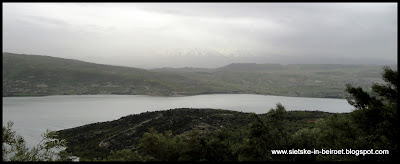 |
A successful Easter Egg Hunt starts with a sniffer dog and the biggest basket you can possibly score. |
I think I’ve mentioned it before, but family ties are a little different over here than in Holland. In Holland, I think I remember the names of all my cousins, but I don’t have a clear idea on what they do in life, and if/how many children they have, let alone the names of their children. Some months ago I ran into the daughter of one of my cousins; it’s a good thing we’ve got strong genes in my family, and she could spot me as one of the clan, otherwise we’d have passed each other in the street without saying so much as hello.
 |
Baskets so big, you’d probably fit in them yourself |
In Lebanon, it’s a little different. Sisters of cousins of nephews are known by name and occupation. If you are the twice removed nephew of someone’s mothers, then you are considered direct family. In Holland, this would be a case of ‘distantly-related’ (ver-verwant). A distantly related family member in Lebanon is someone from a family branch that split off in 1495. Heck, if you share the same last name, you’re family.
 |
| Speed is the key; you’ve got to snatch those eggs before your cousins see them |
I don’t have any family here in Lebanon, other than my hubbie’s, but my sister in-law, who’s married to my husband’s brother, has a family, who sort of consider that, since I am family of her family, then I am also their family.
 |
| “I got it first!” Have you ever tried to pry something out of the clutches of a one year old? |
And each Easter, they organize the family’s Easter Egg Hunt. Actually, it’s the children that hunt the eggs, and the adults supervise from their garden chairs, while sitting in the sun and sipping those lovely wines they produce in this country. In the old days, it must have been more children than adults, but now that the children are growing up, the ratio of egg hunter versus lounging adult is rather skewed.
 |
| Sometimes you find bugs, not eggs. Bugs are nice too |
And so there’s this large gathering of a super-extended family, because the parents of the daughters that have married the brothers of my sister-in-law are also present. In Holland you would consider these strangers. In Lebanon, they’re family. Here they have names for family relationships like that. You’ve got ‘daughters from your mother’s brother’ and ‘daughters from your father’s brother’ and ‘daughters from your mother’s aunt’ and what not else. Very intricate family patterns are identified; some are even untranslatable.
 |
| Counting your stash |
This year, there were only 3 actual hunters. When we run totally out of hunters, I’m sure one of the grandchildren will get married and have children of their own, and the cycle continues.
 |
| It’s been a good year for Easter eggs |
Our children grow up without really understanding the meaning of Easter. My son probably doesn’t even know it is a christian feast, and as far as my daughter is concerned, Easter is about bunnies and chocolate eggs. It’s probably a good thing in this country, where there’s too much emphasis on religion anyway.

















































